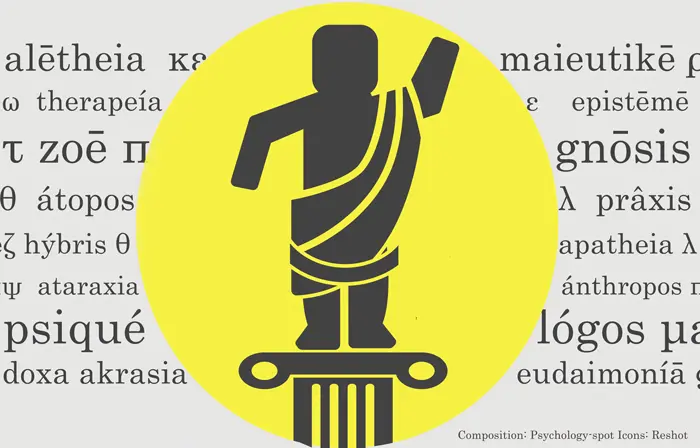
They say that Socrates interrogated his disciples to help them free themselves from erroneous knowledge or false beliefs that prevented them from seeing reality. Socrates asked them questions until the students were plunged into a state of aporia. A kind of dead end in which they were without handles and recognized the impossibility of arriving at a definitive and precise answer with their previous knowledge.
That state of aporia allowed them to recognize that their initial certainties were useless. They understood that if they wanted to keep moving forward they needed to get rid of those preconceptions. They finally realized how much mental ballast they carried with them.
This state, which can be extremely revealing for some, is terrifying to others because they experience it as a process of losing their roots and certainties. However, sometimes, if we want to move forward we must have the courage to immerse ourselves in aporia. This is nothing more than recognizing that perhaps some of the constructs on which we build our world may not be as solid or valid as we thought.
What is aporia?
“Aporia is not the question, but the impossibility of answering it and the feeling of concern that stems from it. Aporia is literally the absence of a path, and also, at the same time, what prevents to end the march. The fact of not having an answer to the question forces us to rethink it in another form or ask adjacent questions”, as the philosopher Pierre Aubenque wrote.
Aporia, however, does not only imply that we realize that many of our certainties have been smashed. It is also an intense emotional state in which excels an uncomfortable feeling of disorientation caused by the absence of the cardinal points that until recently were guiding us.
Uncertainty, confusion and perplexity: The 3 horses of the “aporic apocalypse”
All of us, at some point in our lives, can go through a state of aporia. We will know it because we feel blocked, we are caught in a kind of limbo in which we cannot advance, but we cannot go back either.
In this state, we look for answers, but we do not find them, either because we are asking the wrong questions or because we are starting from false premises or wrong assumptions.
So even though we touch, see and feel reality, it loses its meaning. Suddenly it is strange. It is as if everything is emptied of meaning. At that moment, reason desperately struggles to give meaning to what we are experiencing. But we can’t find it. We could not find an explanation for what happens to us because the conceptual frameworks that guided us don’t work anymore.
That inability to fit everything into our minds creates confusion and puzzlement. It makes our world wobble. At this point we have two options: sinking into despair or taking advantage of that state to take a qualitative leap in our growth path.
We can’t avoid aporia, but we can decide how to react
Aporia is a complicated state to manage, especially for people who are looking for certainties and feel uncomfortable in uncertainty. When their beliefs fall apart, they may experience real panic. They also run the risk of becoming radicalized in an attempt to cling to some certainty. This turns them even more rigid in their thought.
Aporia, however, can also be a great catalyst for personal change. In fact, it predisposes the curious and intelligent mind to discover and accept truths that, before that state, would have been considered unacceptable or intolerable.
Aporia also helps us become more humble. It allows us understand that we do not own the truth and need to open ourselves to other ways of understanding and living. It also teaches us that the life we built is much more fragile than we think. It shows us our most vulnerable side, and that makes us more human.
What if the problem wasn’t the problem?
“What is the answer to the question? The problem. How is the problem solved? Moving the question”, explained Michel Foucault. “Instead of asking and answering dialectically, we should think problematically.”
This French psychologist encourages us to reflect on the matter in a new light, but he also encourages us to think on thinking. Put us in discussion. Doubting our premises. And, above all, accept contradictions and divergence.
Sometimes we cannot understand the world because we apply dichotomous thinking that seeks affirmation or denial, when reality is much more complex than that and demands multiple thinking that encompasses as many options as possible.
Aporia not only erases certainties, also opens wide doors to a world where everything is possible, in which we can find alternative explanations and new ways of seeing things. That is why it is essentially a liberating state that allows us to get rid of old ways of thinking and acting to dare to imagine other ways of being.
Right now we are going through – as a society and individually – a state of aporia. The pandemic has shown us our vulnerability and left us bewildered, looking for securities that are increasingly elusive. We can sink into despair or take advantage of that aporia to detach ourselves from the chains of traditional thought and think of new ways of living. The decision is ours.
Source:
Aubenque, P. (2004) Sócrates y la aporía ontológica. Azafea. Rev. Filos; 6: 17-28.




Reader under storms says
This post was an amazing finding for me. The citations were so on point and what I needed to read.
Gracias
Jennifer Delgado says
Thank you “Reader under storms”…